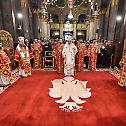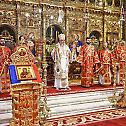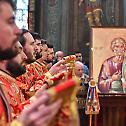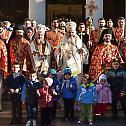Feast of Saint Andrew the Apostle, Protector of Romania, at the Romanian Patriarch
On 30 November, the Orthodox Church celebrates Saint Andrew the Apostle, the First-called, Protector of Romania. The Divine Liturgy was celebrated at the Patriarchal Cathedral in Bucharest by His Beatitude Daniel, Patriarch of Romania, together with His Grace Timotei Prahoveanul, Assistant Bishop to the Archdiocese of Bucharest, assisted by a group of priests and deacons.
Faith is seeing the unseen
After reading the Gospel text of the feast, the Patriarch of Romania delivered a sermon in which he showed that the mystery of the Church is revealed in the prophecy that the Saviour tells the disciples: “This prophecy of Jesus Christ, our Saviour, shows us that, in fact, true faith, confirmation of the divinity of Jesus Christ, opens the heavens. When the heavens are opened we see Jesus with the spiritual eyes of faith, not as simple teacher of Nazareth, but as the Son of the Eternal God who was made Man out of love for human beings and for their salvation. The sight of the open heavens and of the angels around Jesus Christ shows us the mystery of the Church. We are not told that the angels go down and then up, but that the angels go up and down to show us, in fact, that they climb to heaven taking with them the prayers that the Church addresses Christ. In other words, the angels take to heaven the prayers of those who believe that Christ is the Son of God and of those who fulfil His will in their life. They also bring from heavens the blessing of God and the fulfilment of the requests, of the desires expressed in prayers, as well as lots of boons and blessings”.
Saint Andrew the Apostle is the “Apostle of the Romanians”
Saint Andrew the Apostle preached in the Holy Land, in Jerusalem, Judaea, Samaria, and then in Asia Minor, today’s Turkey, and reached Scythia, His Beatitude Patriarch Daniel said, and continued: “As the historians of the first centuries say, among whom Hippolytusof Rome, Origen and Eusebius of Caesarea, as well as the Synaxarion of the Church of Constantinople, Saint Andrew preached in Dobrudgea and in today’s Ukrainian territory, in Great Scythia, and then in Byzantium, today’s Constantinople. Then, he went to Greece and preached the Gospel going up to Patras town where he died a martyr’s death. He was crucified on an X shaped cross”.
His Beatitude emphasised the fact that Saint Andrew the Apostle is considered the father of the Romanian Christianity, the Apostle of the Romanians and beginner of the Christianisation of our people: “Saint Andrew the Apostle is the Apostle of our Getaes-Dacian and Dacian-Roman forerunners who received the baptism of Christ through him. Saint Andrew the Apostle ordained bishops and priests for this population who would generate the Romanian people. Thus, there is no concrete date of the Christianisation of the Romanian people, like of other peoples, as our Christianisation begins with the preaching of Saint Andrew the Apostle and then is continued slowly but deeply, so that we can say that the day of the celebration of Saint Andrew the Apostle is the feast of the Romanian Christianity. Understanding the fact that we have an apostolic faith is very important”.
Saint Andrew the Apostle, the First-called, came from Bethsaida (town on the western shore of Gennesaret lake – Galilee) and was Peter’s brother, and both of them sons of fisherman Iona. He was the disciple of Saint John the Baptist and following the advice of his teacher, he went together with John, son of Zebedee, to find the One about whom the Forerunner said He was the Lamb of God.
Source: basilica.ro





